|
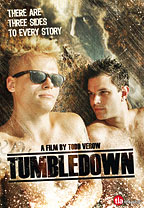
Tumbledown
TLA
Releasing,
2013
Director:
Todd Verow
Screenplay:
Brad Hallowell,
Todd Verow
Starring;
Brad Hallowell,
Brett Faulkner,
Todd Verow.
Candice Hall,
Erica LaChance
Unrated,
80 minutes
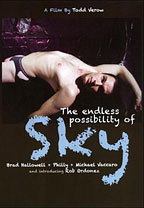
The Endless Possibility
Of Sky
Water Bearer Films,
2012
Director:
Todd Verow
Screenplay:
Todd Verow,
Brad Hallowell,
James Derek Dwyer
Starring;
Brad Hallowell, Philly,
Rob Ordonez, Michael Vaccaro,
Brandon Aguilar,
Michael A. Guzman,
Theodore Bouloukos,
Gary Kramer
Unrated,
85 minutes
|
Todd Verow
Double Feature
by
Michael D. Klemm
Posted online October, 2013
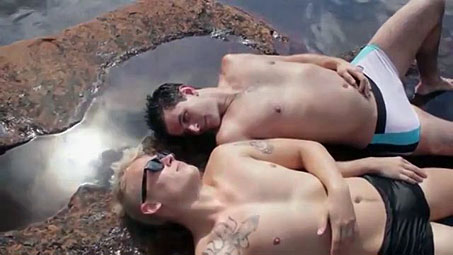
Nine months ago, when I reviewed Bad Boy Street (2012), I wrote that I never thought I would ever use the words warm and fuzzy when describing one of Todd Verow’s films. I’ve just watched Verow’s latest, Tumbeldown and last year's The Endless Possibility Of Sky. You won’t find the words warm and fuzzy this time. |
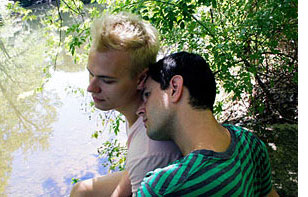 With Tumbledown (2013), the bad boy of queer cinema is back. His latest film is a collaboration with one of his frequent stars, Brad Hallowell, who shares both writing and acting credits. Tumbledown is the tale of a toxic triangle between three men - played by Hallowell, Verow and Brett Faulkner. The film’s tagline is “There are three sides to every story.” Like Kurosawa’s classic Rashoman, an act of violence (in this case, sexual assault) is seen through the eyes of the individual protagonists and each remembers the truth differently. With Tumbledown (2013), the bad boy of queer cinema is back. His latest film is a collaboration with one of his frequent stars, Brad Hallowell, who shares both writing and acting credits. Tumbledown is the tale of a toxic triangle between three men - played by Hallowell, Verow and Brett Faulkner. The film’s tagline is “There are three sides to every story.” Like Kurosawa’s classic Rashoman, an act of violence (in this case, sexual assault) is seen through the eyes of the individual protagonists and each remembers the truth differently.
|
|
 The setting is an un-named small town. Rick (Hallowell) is a likeable young bartender who picks the wrong couple to hang out and have a threeway with. Jay (Verow) is renovating a cottage up on Tumbledown Mountain and stops at the bar with Mike (Faulkner), his bored younger lover. Rick scores drugs for them. A few weeks later, he receives a call from Mike. He invites Rick to spend the weekend with them and also asks if he can bring some “party favors.” The setting is an un-named small town. Rick (Hallowell) is a likeable young bartender who picks the wrong couple to hang out and have a threeway with. Jay (Verow) is renovating a cottage up on Tumbledown Mountain and stops at the bar with Mike (Faulkner), his bored younger lover. Rick scores drugs for them. A few weeks later, he receives a call from Mike. He invites Rick to spend the weekend with them and also asks if he can bring some “party favors.”
|
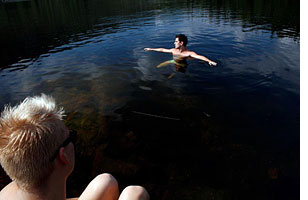 Rick says that he doesn’t do boyfriends but he’s attracted to Mike and their hormones are effervescing. This doesn’t go un-noticed by Jay, especially during an idyllic swim in the nearby lake. A threeway was, in all probability, always the weekend’s goal and - when it happens – Rick and Mike have already started when Jay comes in. Rick rightly, but maybe too brusquely, tells Jay to put on a condom before he fucks him. The two younger men are clearly into each other and they barely notice the third person in their bed. Rick says that he doesn’t do boyfriends but he’s attracted to Mike and their hormones are effervescing. This doesn’t go un-noticed by Jay, especially during an idyllic swim in the nearby lake. A threeway was, in all probability, always the weekend’s goal and - when it happens – Rick and Mike have already started when Jay comes in. Rick rightly, but maybe too brusquely, tells Jay to put on a condom before he fucks him. The two younger men are clearly into each other and they barely notice the third person in their bed.
|
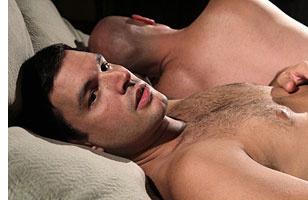 Two weeks pass. Rick gets another call, from Jay this time, inviting him up to the cabin. Mike is not there, and Jay thought that he would be driving up with Rick. Jay’s behavior is suspicious and Rick, though uncomfortable by Mike’s absence, doesn’t really notice. But then something happens – I will not disclose what, but most readers can probably make a ballpark guess – and a very confused Rick awakes the next morning in Jay’s bed. With no memory of what has happened, he flees the cabin. Two weeks pass. Rick gets another call, from Jay this time, inviting him up to the cabin. Mike is not there, and Jay thought that he would be driving up with Rick. Jay’s behavior is suspicious and Rick, though uncomfortable by Mike’s absence, doesn’t really notice. But then something happens – I will not disclose what, but most readers can probably make a ballpark guess – and a very confused Rick awakes the next morning in Jay’s bed. With no memory of what has happened, he flees the cabin.
|
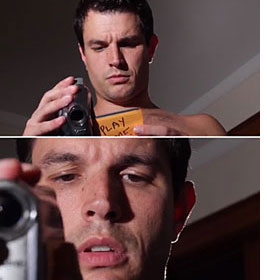 A few months later, a package arrives at Rick’s door. It contains a small video camera with a post-it note that says “play me.” Again, I won’t reveal what is on the tape (even if the trailer does) but the look of shocked pain on Rick’s face, in tight close-up, will remain with me for a long time. It reminded me of those anguished faces that fill the screen in so many of Ingmar Bergman’s films. They say that acting is all in the eyes and his express more emotions than a soliloquy from Hamlet. A few months later, a package arrives at Rick’s door. It contains a small video camera with a post-it note that says “play me.” Again, I won’t reveal what is on the tape (even if the trailer does) but the look of shocked pain on Rick’s face, in tight close-up, will remain with me for a long time. It reminded me of those anguished faces that fill the screen in so many of Ingmar Bergman’s films. They say that acting is all in the eyes and his express more emotions than a soliloquy from Hamlet.
|
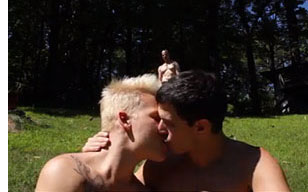 We’ve just watched Rick’s version of the tale. But now we wonder if we’ve really seen the truth when screen titles begin to crawl over a peaceful shot of the lake. We’re told that this is based on a true story, that the names have been changed to “protect the innocent and the guilty,” and also that people “believe what they want to believe, remember what they want to remember, and tell the truth they want people to believe.” Jay's and Mike’s accounts follow. We’ve just watched Rick’s version of the tale. But now we wonder if we’ve really seen the truth when screen titles begin to crawl over a peaceful shot of the lake. We’re told that this is based on a true story, that the names have been changed to “protect the innocent and the guilty,” and also that people “believe what they want to believe, remember what they want to remember, and tell the truth they want people to believe.” Jay's and Mike’s accounts follow.
|
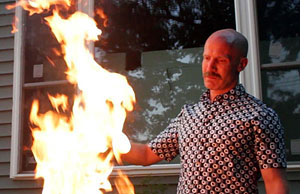 Jay’s friendly demeanor has already been stripped bare to expose the monster beneath. But, in his version of the story, Jay initially comes across as sympathetic. He grows jealous with good reason. He finds the two young lads kissing in the woods, and Rick pushes him away this time when he joins them in bed. And then Mike vanishes for two weeks. Jay is genuinely concerned when his calls aren’t returned, but he’s also convinced that Mike is with Rick. He’s mad and he’s jealous but that doesn’t excuse his malicious revenge. Jay tries to play the victim card but the path that his anger leads to isn’t pretty and it’s captured in real time - in one excruciatingly long and unbroken camera take. A similar long take climaxed Verow’s earlier film, Leave Blank (2011) and, in both cases, the viewer’s visceral discomfort is stretched to the breaking point by the cold, impassive and static camera. Jay’s friendly demeanor has already been stripped bare to expose the monster beneath. But, in his version of the story, Jay initially comes across as sympathetic. He grows jealous with good reason. He finds the two young lads kissing in the woods, and Rick pushes him away this time when he joins them in bed. And then Mike vanishes for two weeks. Jay is genuinely concerned when his calls aren’t returned, but he’s also convinced that Mike is with Rick. He’s mad and he’s jealous but that doesn’t excuse his malicious revenge. Jay tries to play the victim card but the path that his anger leads to isn’t pretty and it’s captured in real time - in one excruciatingly long and unbroken camera take. A similar long take climaxed Verow’s earlier film, Leave Blank (2011) and, in both cases, the viewer’s visceral discomfort is stretched to the breaking point by the cold, impassive and static camera.
|
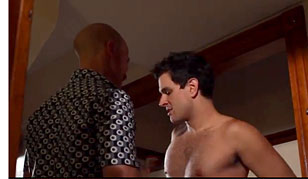 Verow likes to provoke. He has been on my radar ever since I was first freaked out by Frisk back in '96. His movies are raw and confessional, and unconcerned with mundane things like box office. Agitprop sometimes trumps plot but the results are always intriguing - even when the execution is sloppy. His Bulldog in the Whitehouse (2006) was amateurish but was also one of the best – and rudest - attacks on the Bush administration this reviewer has ever seen. Autobiographical themes are common (see Vacationland, Between Something & Nothing and Anonymous) and explicit sex is plentiful. Filming in digital video with non-existent budgets, he trusts his actors to improvise and, when it works, the results can get under your skin. Verow likes to provoke. He has been on my radar ever since I was first freaked out by Frisk back in '96. His movies are raw and confessional, and unconcerned with mundane things like box office. Agitprop sometimes trumps plot but the results are always intriguing - even when the execution is sloppy. His Bulldog in the Whitehouse (2006) was amateurish but was also one of the best – and rudest - attacks on the Bush administration this reviewer has ever seen. Autobiographical themes are common (see Vacationland, Between Something & Nothing and Anonymous) and explicit sex is plentiful. Filming in digital video with non-existent budgets, he trusts his actors to improvise and, when it works, the results can get under your skin.
|
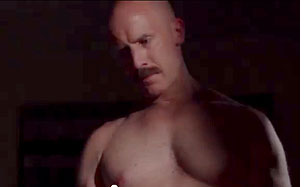 I never expect Hollywood gloss when I watch his films but - and this was true of his previous Bad Boy Street too - the photography is more polished than before. Aside from the nice mountain scenery, the interiors are artfully composed and often claustrophobic – the mise en scéne of that long, disturbing, one-shot camera take was especially effective. I liked the moody piano score as well. Tumbledown’s dream-like opening, (which might actually be the film’s ending), functions as an ominous overture. Rick and Mike are having explicit sex when the backlit silhouette of Jay enters the room like a Universal horror film monster. His shadow falls over the lovers. Rick sees him and then awakes as if from a dream. This sets the tone for the rest of the film; which is sexy and creepy, and rife with contradictions. I never expect Hollywood gloss when I watch his films but - and this was true of his previous Bad Boy Street too - the photography is more polished than before. Aside from the nice mountain scenery, the interiors are artfully composed and often claustrophobic – the mise en scéne of that long, disturbing, one-shot camera take was especially effective. I liked the moody piano score as well. Tumbledown’s dream-like opening, (which might actually be the film’s ending), functions as an ominous overture. Rick and Mike are having explicit sex when the backlit silhouette of Jay enters the room like a Universal horror film monster. His shadow falls over the lovers. Rick sees him and then awakes as if from a dream. This sets the tone for the rest of the film; which is sexy and creepy, and rife with contradictions.
|
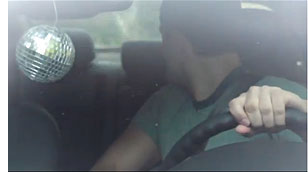 Verow often plays games with the truth in his movies. The fractured narrative of Deleted Scenes (2011) was made up of the events that we edit from our memories while re-writing our lives. The multiple viewpoints in Tumbledown can be confusing (especially in terms of character) but this is also, paradoxically, one of its strengths. Could the characters and the action have been fleshed out more? Probably, but because truth is elusive the audience is forced to fill in the narrative gaps. In act three, when we find out why Mike vanished, yet another twist is added to the assault. Regrettably though, just when things look like they are going to get interesting again, the ending is left wide open and I have to admit that, while I liked most of Tumbledown, I think I would have preferred a little more closure. Verow often plays games with the truth in his movies. The fractured narrative of Deleted Scenes (2011) was made up of the events that we edit from our memories while re-writing our lives. The multiple viewpoints in Tumbledown can be confusing (especially in terms of character) but this is also, paradoxically, one of its strengths. Could the characters and the action have been fleshed out more? Probably, but because truth is elusive the audience is forced to fill in the narrative gaps. In act three, when we find out why Mike vanished, yet another twist is added to the assault. Regrettably though, just when things look like they are going to get interesting again, the ending is left wide open and I have to admit that, while I liked most of Tumbledown, I think I would have preferred a little more closure.
|
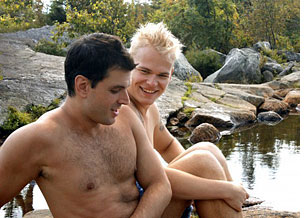 One of the problems with having extras on a DVD is that they can change your perception of a film. Especially when an alternate ending is included. The film itself ends ambiguously, but the ten minutes added to the alternate ending does reveal what happened and now I can’t distinguish between the two when I think about Tumbledown. Much of this alternate ending is very well executed; its inclusion suggests that the director is still attached to it and wishes his audience to see what he filmed (before deciding to cut it). There’s nothing wrong with that but it can muddy your feelings about the finished film. I’m finding it almost impossible now to stop thinking about the cut ending instead of the real one. For this reason, I am avoiding the deleted and extended scenes until I finish writing this review. One of the problems with having extras on a DVD is that they can change your perception of a film. Especially when an alternate ending is included. The film itself ends ambiguously, but the ten minutes added to the alternate ending does reveal what happened and now I can’t distinguish between the two when I think about Tumbledown. Much of this alternate ending is very well executed; its inclusion suggests that the director is still attached to it and wishes his audience to see what he filmed (before deciding to cut it). There’s nothing wrong with that but it can muddy your feelings about the finished film. I’m finding it almost impossible now to stop thinking about the cut ending instead of the real one. For this reason, I am avoiding the deleted and extended scenes until I finish writing this review.
|
There are some heavy scenes in this film but I’ve come to expect that from Verow. Other queer films I see are instantly forgettable. Not his, and not this one either. Despite flaws, I can’t get Tumbledown out of my head and I am not going to forget it anytime soon.
THE ENDLESS POSSIBILITY OF SKY
|
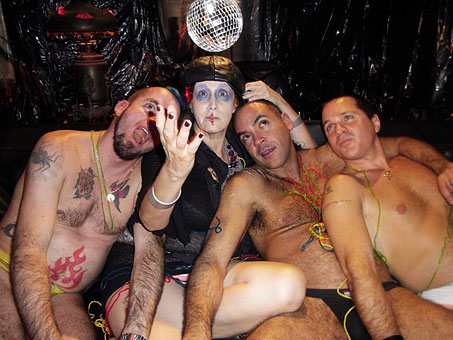 |
One can never accuse Todd Verow of holding anything back in his films. The Endless Possibility Of Sky (2012) is an extreme – and I mean extreme – study of drug addiction that makes Danny Boyle's Trainspotting look understated. |
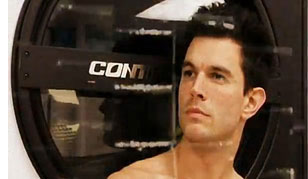 For Drew (Brad Hallowell), the party must never stop. “When you’ve reached the sky,” he tells us, “it’s all downhill from there.” He lives in opposing worlds. When he isn’t on a weeks-long drug and sex bender in New York City, he’s atoning for his sins by living as boring a life as possible in Waterville, Maine. His friend, Christian (Michael Vaccaro), was his first love. He often invites Drew to parties in the Big Apple and the cycle begins anew. For Drew (Brad Hallowell), the party must never stop. “When you’ve reached the sky,” he tells us, “it’s all downhill from there.” He lives in opposing worlds. When he isn’t on a weeks-long drug and sex bender in New York City, he’s atoning for his sins by living as boring a life as possible in Waterville, Maine. His friend, Christian (Michael Vaccaro), was his first love. He often invites Drew to parties in the Big Apple and the cycle begins anew.
|
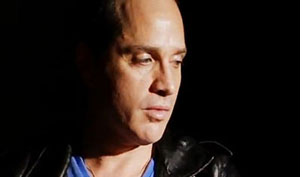 Christian watched a lot of friends die during the 80s and he binges on drugs because “you can only live in fear for so long before you become a zombie.” He has anonymous sex in a restroom stall while waiting for his HIV test results. He enjoys a brief fling with Rob (Rob Ordonez), a homeless club boy with a blue mohawk. Rob is a lost soul, and willing to go home with anyone for a place to sleep. Rob’s friend, Bruno (Brandon Aguilar), is a porn star. Drew, the film’s main narrator, thinks they are “the new sexual outlaws.” The difference now is that it’s all about the drugs and not the sex. Christian watched a lot of friends die during the 80s and he binges on drugs because “you can only live in fear for so long before you become a zombie.” He has anonymous sex in a restroom stall while waiting for his HIV test results. He enjoys a brief fling with Rob (Rob Ordonez), a homeless club boy with a blue mohawk. Rob is a lost soul, and willing to go home with anyone for a place to sleep. Rob’s friend, Bruno (Brandon Aguilar), is a porn star. Drew, the film’s main narrator, thinks they are “the new sexual outlaws.” The difference now is that it’s all about the drugs and not the sex.
|
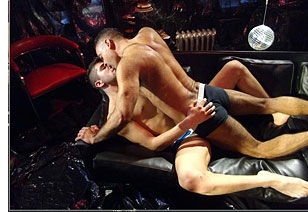 They all hang out in the hellish apartment of one Mistress DaTina (Philly) where the party is 24/7. If you have the money, DaTina has the drugs. She opens her home to a perpetual parade of gay men who seem reality challenged. None of them mind shedding all their clothes at the door and tying them up in black garbage bags (she has a paranoia of bedbugs and extraterrestrial reptiles). They remain in DaTina’s den - nude or in their underwear - getting high and fucking there so that she’s not alone and has company. Calling these guys self destructive is an understatement. They all hang out in the hellish apartment of one Mistress DaTina (Philly) where the party is 24/7. If you have the money, DaTina has the drugs. She opens her home to a perpetual parade of gay men who seem reality challenged. None of them mind shedding all their clothes at the door and tying them up in black garbage bags (she has a paranoia of bedbugs and extraterrestrial reptiles). They remain in DaTina’s den - nude or in their underwear - getting high and fucking there so that she’s not alone and has company. Calling these guys self destructive is an understatement.
|
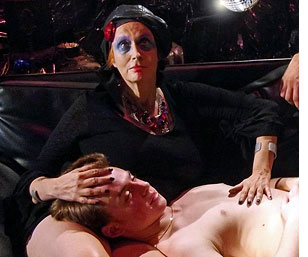 It is a clear sign that you are doing way too many drugs when you to want to hang out in this nightmarish nook. The rooms are draped in black garbage bags, the bathroom is covered in aluminum foil (a playful reference to Andy Warhol's Factory?), and then there’s the hostess who looks like an extra from one of the Roman orgies in Fellini’s Satyricon. She adds much of the comic relief but she is so grotesque that you sometimes wish she would vanish from the screen. Later we will learn her tragic backstory, and also why she wears a blinking red bicycle light on the bandana around her head. The flashback of her transformation at a make-up mirror into DaTina, surprisingly, is one of the film’s more moving scenes. It is a clear sign that you are doing way too many drugs when you to want to hang out in this nightmarish nook. The rooms are draped in black garbage bags, the bathroom is covered in aluminum foil (a playful reference to Andy Warhol's Factory?), and then there’s the hostess who looks like an extra from one of the Roman orgies in Fellini’s Satyricon. She adds much of the comic relief but she is so grotesque that you sometimes wish she would vanish from the screen. Later we will learn her tragic backstory, and also why she wears a blinking red bicycle light on the bandana around her head. The flashback of her transformation at a make-up mirror into DaTina, surprisingly, is one of the film’s more moving scenes.
|
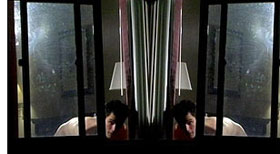 The Endless Possibility Of Sky is fragmented, like the characters’ lives (not to mention the title). Flashy cinematography, including some unique kaleidoscope effects, enhances the drug-fueled plot. Crude animated sequences by Katie Armstrong add a Yellow-Submarine-on-acid vibe to the movie; look for images like the Empire State Building morphing into a hypodermic needle. This is not a conventional movie by any means. James Derek Dwyer's background score is, at times, oddly composed of Christmas Carols in radically different instrumental arrangements. “Jingle Bells” played slowly in a minor key on the piano sticks in my head. The Endless Possibility Of Sky is fragmented, like the characters’ lives (not to mention the title). Flashy cinematography, including some unique kaleidoscope effects, enhances the drug-fueled plot. Crude animated sequences by Katie Armstrong add a Yellow-Submarine-on-acid vibe to the movie; look for images like the Empire State Building morphing into a hypodermic needle. This is not a conventional movie by any means. James Derek Dwyer's background score is, at times, oddly composed of Christmas Carols in radically different instrumental arrangements. “Jingle Bells” played slowly in a minor key on the piano sticks in my head.
|
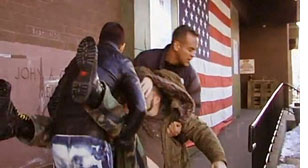 The parties alternate with scenes of Drew coasting through life in Watertown. He picks up a couple of guys, drives his car around a lot, has a wank in the shower, goes grocery shopping and does laundry with his shirt off in a late night Laundromat. Rob keeps going home with the wrong guy. He overdoses and is found by an older man (Theodore Bouloukos) who takes him home and keeps him as a drugged sex slave. Some fresh meat arrives at DaTina’s and she thinks one of them looks like her son. The parties alternate with scenes of Drew coasting through life in Watertown. He picks up a couple of guys, drives his car around a lot, has a wank in the shower, goes grocery shopping and does laundry with his shirt off in a late night Laundromat. Rob keeps going home with the wrong guy. He overdoses and is found by an older man (Theodore Bouloukos) who takes him home and keeps him as a drugged sex slave. Some fresh meat arrives at DaTina’s and she thinks one of them looks like her son.
|
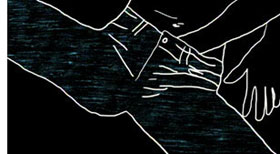 The story meanders but it’s never boring – it’s just a little over-the-top at times. (Actually, more than a little.) A lot of this is interesting; his films always are – but - to be honest, The Endless Possibility Of Sky is all over the place and could use a little more focus. Obviously the film was supposed to be shocking, and it certainly succeeds on that level, but some of the events are just a little too extreme to be taken seriously. The story meanders but it’s never boring – it’s just a little over-the-top at times. (Actually, more than a little.) A lot of this is interesting; his films always are – but - to be honest, The Endless Possibility Of Sky is all over the place and could use a little more focus. Obviously the film was supposed to be shocking, and it certainly succeeds on that level, but some of the events are just a little too extreme to be taken seriously.
|
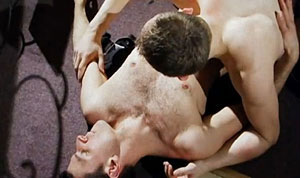 Perhaps to establish an air of some authority, the film opens with a writer scribbling in his notebook about the denizens of DaTina’s den. “The details may be fuzzy,” he writes, but “the shards of truth are there.” The writer is as stoned as his subjects, and that makes the narrative suspect. Multiple unreliable narrators probably muddy the waters even further. Impaired observations, exaggerated by the drugs, may account for how over the top the ending of this film is. This is melodramatic tragedy on an operatic scale. Hell, it’s almost Kabuki. Perhaps to establish an air of some authority, the film opens with a writer scribbling in his notebook about the denizens of DaTina’s den. “The details may be fuzzy,” he writes, but “the shards of truth are there.” The writer is as stoned as his subjects, and that makes the narrative suspect. Multiple unreliable narrators probably muddy the waters even further. Impaired observations, exaggerated by the drugs, may account for how over the top the ending of this film is. This is melodramatic tragedy on an operatic scale. Hell, it’s almost Kabuki.
|
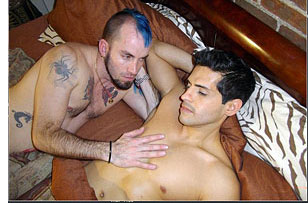 Yet, flaws and all, I can’t get the film out of my head. Sky is an ambitious film even if not always successful. Some might call this porn with a plot but the sex in Verow’s films is always important. There is a lot of explicit sex, some of it hot, but I noticed that not all of it is especially erotic this time. It is worth noting that many of the scenes in DaTina’s den are eventually drained of all sensuality. These guys are just mindlessly fucking and, as it all becomes more and more meaningless, the photography of these naked men becomes less and less flattering. As things get more and more ugly, so do these “sexual outlaws.” Yet, flaws and all, I can’t get the film out of my head. Sky is an ambitious film even if not always successful. Some might call this porn with a plot but the sex in Verow’s films is always important. There is a lot of explicit sex, some of it hot, but I noticed that not all of it is especially erotic this time. It is worth noting that many of the scenes in DaTina’s den are eventually drained of all sensuality. These guys are just mindlessly fucking and, as it all becomes more and more meaningless, the photography of these naked men becomes less and less flattering. As things get more and more ugly, so do these “sexual outlaws.”
|
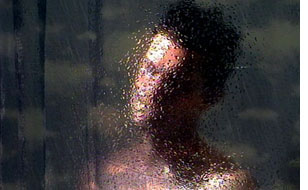 As is usually the case in his films, the credits list Verow as producer, director, cameraman and editor. He’s also billed first as writer along with his longtime creative partner, John Derek Dwyer, and star Brad Hallowell. And, like the next film he made, (the much more polished Bad Boy Street), additional dialogue is credited to the entire cast. Verow’s films are certainly group efforts, much like a live theatre troupe’s company-developed shows. This can be both good and bad but, as I’ve said in the past, the resulting movies are far more interesting than most mega-budget Hollywood tripe. There are moments in this film that I will never forget, and also a few that I wish I could. Still, I wouldn’t have missed it for the world. I'm not going to forget this one anytime soon. As is usually the case in his films, the credits list Verow as producer, director, cameraman and editor. He’s also billed first as writer along with his longtime creative partner, John Derek Dwyer, and star Brad Hallowell. And, like the next film he made, (the much more polished Bad Boy Street), additional dialogue is credited to the entire cast. Verow’s films are certainly group efforts, much like a live theatre troupe’s company-developed shows. This can be both good and bad but, as I’ve said in the past, the resulting movies are far more interesting than most mega-budget Hollywood tripe. There are moments in this film that I will never forget, and also a few that I wish I could. Still, I wouldn’t have missed it for the world. I'm not going to forget this one anytime soon.
|
More
on Todd Verow :
Frisk
Anonymous
Bulldog In The Whitehouse
Vacationland
Between Something & Nothing
The Boy With The Sun In His Eyes
Deleted Scenes
Leave Blank
Bad Boy Street
Brad Hallowell also appears in:
Vacationland
Deleted Scenes
Michael Vaccaro also appears in:
Deleted Scenes
Philly also appears in :
Anonymous
Bulldog In The Whitehouse
Between Something & Nothing
The Boy With The Sun In His Eyes
Deleted Scenes
Theodore Bouloukos also appears in:
Bulldog In The Whitehouse
Vacationland
Berlin
Film Festival Essay:
No More Mr. Nice Guy
a
Manifesto by Todd Verow |


